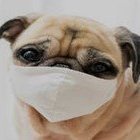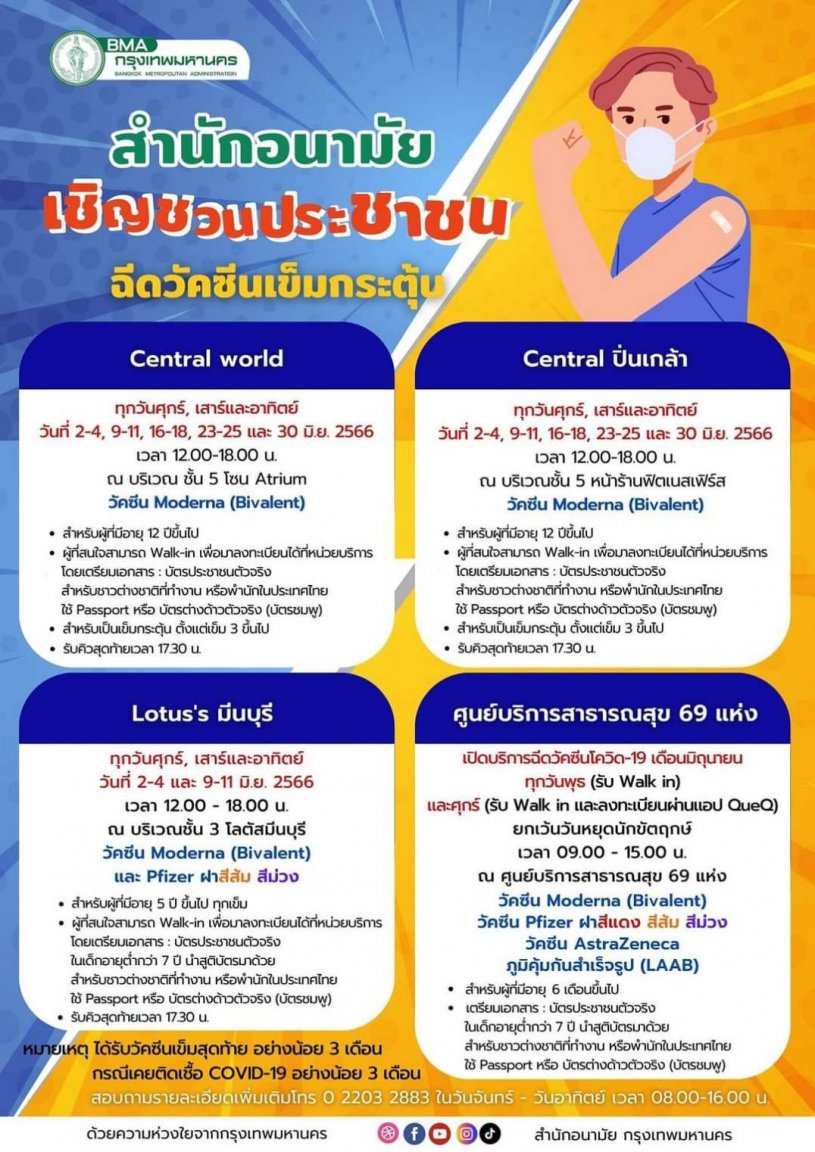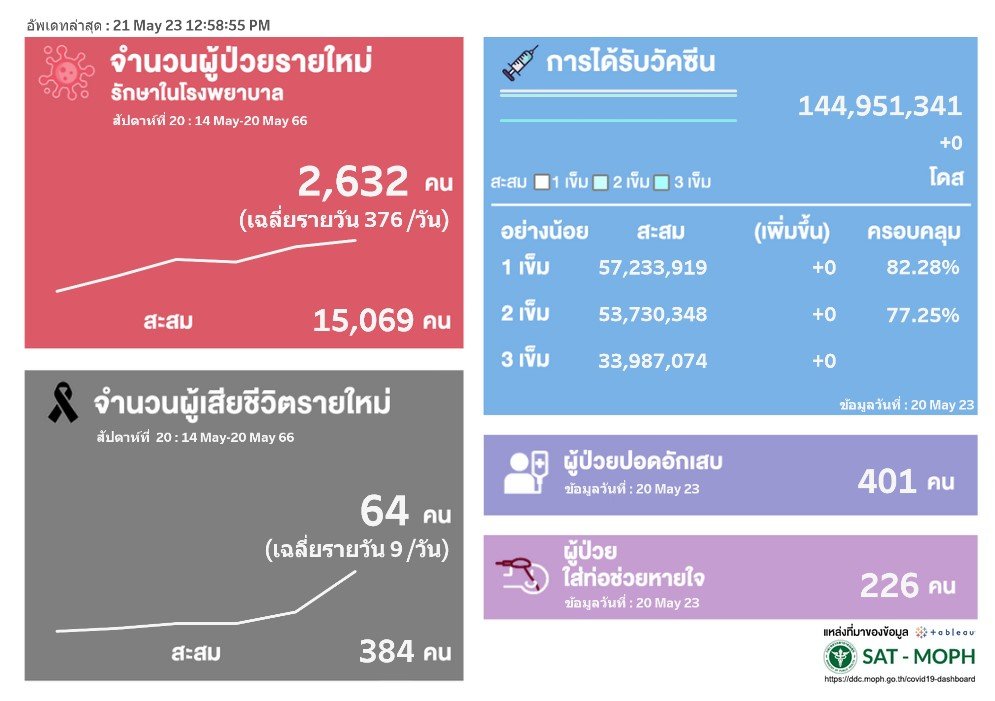-
Posts
37,239 -
Joined
-
Last visited
-
Days Won
6
Content Type
Events
Forums
Downloads
Quizzes
Gallery
Blogs
Everything posted by TallGuyJohninBKK
-
Dunno where the downpour is/was... I live in central BKK, and the only rain I've seen was a half hour or so of very light showers Monday afternoon. Other than that, dry as a bone today/Tuesday... though mercifully quite cooler this week.
-
Per the Thai Ministry of Public Health and Bangkok medical services: 1. CentralWorld - every Friday, Saturday and Sunday. June 2-4, 9-11, 16-18, 23-25 and 30, Noon to 6 pm 5th floor, Atrium Zone Moderna (Bivalent) vaccine is available to people 12 years of age and older as a booster dose. 2. Central Pinklao - every Friday, Saturday and Sunday. June 2-4, 9-11, 16-18, 23-25 and 30, Noon to 6 pm 5th floor in front of Fitness First Moderna (Bivalent) Vaccine is available to people 12 years of age and older as a booster dose. 3. Lotus's Minburi - every Friday, Saturday and Sunday. June 2-4 and 9-11, Noon to 6 pm 3rd floor, Lotus Minburi Moderna (Bivalent) and Pfizer vaccines, orange and purple lids, available to people aged 5 and over. (children under 7 years of age must bring their birth certificate) 4. 69 BMA public health service centers in Bangkok - Wednesdays and Fridays, except public holidays. Walk-in service or pre-register through the QueQ app. Time 9 am to 3 pm Moderna Vaccine (Bivalent), Pfizer red, orange, purple cap, AstraZeneca Immunotherapy ready (LAAB) is available to those aged 6 months and older (children under 7 years old must bring their birth certificate). For more information, call 02 203 2883. Monday - Sunday from 8 am - 4 pm https://www.facebook.com/informationcovid19/posts/pfbid0L7rseUtyLVmhBTyMt2J4KN8B7muVrnBf9npRDVUeH4i6qkd9ptf7bxQFQmwvxEnEl
-
Two thoughts here: 1. If this monk was "renowned" before, he certainly is even more renowned now, but not in a very good way. 2. Glad to see that the local monks, who supposedly follow a code of poverty, easily were able to quickly scrape together 200,000 baht to pay off the mess the guy made. I wonder if that's the kind of use the local congregants were expecting for their donations when they previously handed them over to the temple?
-

Public advised to protect themselves as COVID-19 cases surge
TallGuyJohninBKK replied to webfact's topic in Thailand News
Thai PBS had a pretty good recap of current things Thailand COVID related on Saturday: "a warning yesterday from Dr. Nitipat Jiarakul, chief of the Division of the Respiratory Diseases and Tuberculosis at the Faculty of Medicine at Siriraj Hospital, that COVID-19 is staging a comeback, with as many as 20,000-40,000 people being infected each day, about 20 times more than the rate of infection in April. According to Dr. Nitipat, admissions to hospitals have increased to about 400 a day, from about 20 in April and, of these, 5% are suffering lung infections and half of them have died. The death toll also surged 20 fold, to about 66 a week now instead of just 4 in April." https://www.thaipbsworld.com/siriraj-hospitals-icu-and-ipd-fully-occupied-with-covid-19-patients/ Note re the above report -- the estimate of 20,000 to 40,000 new COVID cases per day is that of estimated infections, which the Thai government no longer officially tracks or publicly reports. The current data the Thai government reports as COVID cases are in fact only new COVID hospitalizations on a weekly basis, which obviously are much smaller real numbers than the estimated numbers of infections. -

Public advised to protect themselves as COVID-19 cases surge
TallGuyJohninBKK replied to webfact's topic in Thailand News
As usual, your post above is full of all kinds of claims and speculation, and not a single documented supporting fact or credible supporting source to be found anywhere. -

Where can one get an AstraZeneca jab in Bkk? Should I bother?
TallGuyJohninBKK replied to ubonr1971's topic in Bangkok
I'm not aware of any reason that someone with heart disease would be advised by knowledgeable doctors to NOT receive a mRNA COVID vaccine. COVID mRNA vaccines are safe in patients with heart failure 22 Aug 2022 "Barcelona, Spain – 22 Aug 2022: COVID mRNA vaccines are associated with a decreased risk of death in patients with heart failure, according to research presented at ESC Congress 2022.1 The study also found that the vaccines were not associated with an increased risk of worsening heart failure, venous thromboembolism or myocarditis in heart failure patients. “Our results indicate that heart failure patients should be prioritised for COVID-19 vaccinations and boosters,” said study author Dr. Caroline Sindet-Pedersen of Herlev and Gentofe Hospital, Hellerup, Denmark. “COVID-19 vaccines will continue to be important for preventing morbidity and mortality in vulnerable patient populations. Thus, studies emphasising the safety of these vaccines are essential to reassure those who might be hesitant and ensure continued uptake of vaccinations.” https://www.escardio.org/The-ESC/Press-Office/Press-releases/COVID-mRNA-vaccines-are-safe-in-patients-with-heart-failure -

Siriraj Says All Beds For Critical Covid Patients Full
TallGuyJohninBKK replied to webfact's topic in Bangkok News
I believe the famous Dr. Yong has lately been quoted as predicting the current COVID surge is likely to continue into June and July before subsiding.... That seems to be one prediction. I have no idea whether his predicted timeline will turn out to be too pessimistic or too optimistic... Waiting to find out as the weeks pass. -

Siriraj Says All Beds For Critical Covid Patients Full
TallGuyJohninBKK replied to webfact's topic in Bangkok News
The Thai government has previously and publicly said they're moving toward an ANNUAL COVID vaccine program for this year and next year for the general public, to coincide with the flu shots period. You have to make some allowances for how the Google Translate version of original Thai content handles the nuances of some things.... -

Siriraj Says All Beds For Critical Covid Patients Full
TallGuyJohninBKK replied to webfact's topic in Bangkok News
Obviously that was a typo on my part... The Thai government is saying the recent deaths mostly involve the UN vaccinated and UNDER vaccinated.... as has been the case all along. -

Public advised to protect themselves as COVID-19 cases surge
TallGuyJohninBKK replied to webfact's topic in Thailand News
Perhaps it had something to do with the actual headline of the posted news report: Siriraj says all beds for critical Covid patients full https://thainewsroom.com/2023/05/27/siriraj-says-all-beds-for-critical-covid-patients-full/ And nowhere in the article does the article itself make any mention of the report involving the private vs public parts of the hospital. Those terms aren't ever used in the article. Perhaps if the original article had been more clear and less misleading, then you wouldn't have had to post the following that you did regarding Siriraj subsequently having to issue a clarification: "From a source we cannot quote on here, Siriraj issued a clarification that the situation in the public side was normal and controllable, they have not added any COVID beds as they did at the peak." -

Public advised to protect themselves as COVID-19 cases surge
TallGuyJohninBKK replied to webfact's topic in Thailand News
My earlier comments were simply in response to the news thread here on the topic of Siriraj hospital turning away COVID cases -- though it was later clarified that that was the smaller private part of Siriraj and not the larger public wing of the hospital. But regardless, the MoPH has often played games with statistics when it comes to hospital bed utilization for COVID... From the above report, is it clear that the utilization percentage they're citing is of COVID hospitalizations vs. all available hospital beds, OR, COVID hospitalizations vs all COVID-suitable hospital beds? It's not clear to me which ratio they're using. At least in the past, the public health system here didn't put contagious COVID cases in general wards along with routine patients, but instead, put them in special rooms with special equipment and often negative pressure to avoid spreading the virus, a room type of which the available numbers are much smaller. Whether they're still doing that now, I haven't seen any reports lately. -

Siriraj Says All Beds For Critical Covid Patients Full
TallGuyJohninBKK replied to webfact's topic in Bangkok News
Almost 700 people are currently hospitalized with COVID in Thailand right now either in serious condition and/or requiring intubation in order to breathe. The government continues to say that most COVID deaths here are occurring either among the entirely vaccinated or the under-vaccinated (non boosted and/or long out-of-date vaccinations). It's abundantly clear, as it always has been, that it's much safer for people's health overall to get vaccinated than to risk the health harms of COVID as an unvaccinated / under-vaccinated person. From a government news report out today via Google Translate: "The Department of Medicine recommends that people receiving the COVID-19 vaccine Not complete or not given a booster for more than 3 months should go get a booster dose of the COVID-19 vaccine to help reduce the severity of being infected with COVID-19. Due to the statistics of COVID patients who died in the past week, more than 90% are those who have not been vaccinated or have not completed the vaccine." https://nbt2hd.prd.go.th/th/content/category/detail/id/2153/iid/185098 -

Public advised to protect themselves as COVID-19 cases surge
TallGuyJohninBKK replied to webfact's topic in Thailand News
The BKK Post just posted an article online saying new COVID deaths in the most recent week (May 21-27) declined to 42 compared to the year-high number of 64 in the previous week. Curiously, though, the Post's current online report is entirely silent on the latest weekly figures for new COVID hospitalizations, which also reached a year high number of 2,632 two weeks ago (May 14-20). -

Public advised to protect themselves as COVID-19 cases surge
TallGuyJohninBKK replied to webfact's topic in Thailand News
No, at least according to a government news report out today, talking about recent COVID deaths, they mostly remain those who are unvaccinated or under-vaccinated (wherein they appear to be saying un-boosted). Last paragraph of the following government news report dated today, via Google Translate: "Due to the statistics of COVID patients who died in the past week, more than 90% are those who have not been vaccinated or have not completed the vaccine." https://nbt2hd.prd.go.th/th/content/category/detail/id/2153/iid/185098 And talking about the breakdown of current COVID hospitalizations by type of symptoms, again via Google Translate of the second to last paragraph: --240 asymptomatic, representing 9.7%, --687 mild symptoms, representing 27.8%, --moderate symptom group, 1,146 cases, representing 46.30%, --402 heavy cases, 16.2%, --278 intubation, 11.2% Even though it's variants of Omicron, there are still nearly 700 people currently hospitalized with COVID in Thailand who are in serious condition and/or require intubation in order to breathe. -

Siriraj Says All Beds For Critical Covid Patients Full
TallGuyJohninBKK replied to webfact's topic in Bangkok News
Which is relatively meaningless, because the demand for COVID serious condition hospital beds isn't spread as an average across the whole nation, but instead, is occurring mostly in a few provinces where the COVID hospitalization numbers are the highest. Provinces including Bangkok, Chonburi, Samut Sakhon, Surat Thani, Songkhla and a few others. Having spare, unused COVID beds in Chiang Mai isn't going to do much good for COVID hospitalizations in Bangkok. -

Siriraj Says All Beds For Critical Covid Patients Full
TallGuyJohninBKK replied to webfact's topic in Bangkok News
One public hospital, one of the main and most prestigious ones in the country, publicly posted it's being overrun by COVID patients... Unfortunately, the Thai MoPH no longer publicly reports on COVID patient / hospital utilization rates as they did in the past. There very well could be multiple other hospitals in BKK and other high caseload areas that are experiencing the same COVID patient surges... but just not publicly talking about it. The government's central public health system isn't usually particularly keen to be publicly admitting they can't actually handle the patient demands they're facing. -

Siriraj Says All Beds For Critical Covid Patients Full
TallGuyJohninBKK replied to webfact's topic in Bangkok News
Bangkok had 466 NEW COVID hospitalizations last week (May 14-20), out of 2,632 reported nationwide. And cumulatively for May 14-20, the Thai MoPH reported 401 COVID patients hospitalized in serious condition nationwide, with 226 requiring intubation because they're unable to breathe otherwise... Those tallies for a week ago were up from comparable numbers of 322 and 163 for the prior period two weeks ago of May 7-13. In other words, the nationwide tally of COVID patients hospitalized in serious condition increased by 79 just in a one-week period, and the number of COVID intubations increased by 63 in the same one week period. When you're adding hundreds of new COVID hospitalizations every week in Bangkok, it's not going to take very long before the medical infrastructure begins to get strained. Translation of latest MoPH chart on new COVID hospitalizations ranked by province, May 14-20: https://ddc.moph.go.th/covid19-dashboard/?dashboard=province And the latest weekly nationwide COVID recap report for May 14-20: https://ddc.moph.go.th/covid19-dashboard/ -

Public advised to protect themselves as COVID-19 cases surge
TallGuyJohninBKK replied to webfact's topic in Thailand News
Sure glad to hear from the various and regular COVID denying posters here that COVID is done and gone in the world and in Thailand. Now, if they could only convince Siriraj Hospital and its overflowing numbers of critical condition COVID patients of the same. Siriraj Says All Beds For Critical Covid Patients Full https://aseannow.com/topic/1296093-siriraj-says-all-beds-for-critical-covid-patients-full/ -

Public advised to protect themselves as COVID-19 cases surge
TallGuyJohninBKK replied to webfact's topic in Thailand News
Went back and checked my Amazon ordering history. My first orders of N95 masks from Amazon U.S. were several in early 2018.... and then continuing onward from there.... Long before COVID came along, masks were a thing in BKK, Chiang Mai and elsewhere. -

Public advised to protect themselves as COVID-19 cases surge
TallGuyJohninBKK replied to webfact's topic in Thailand News
I'd been wearing N95 masks here in BKK seasonally for several years before COVID came along, because of the very high levels of PM2.5 air pollution typically from the fall through spring months. I was lucky and fortunate to have been doing so, because then when COVID came along, I already had a good surplus supply of N95 masks at home ready to wear.... in the first two-year period of the pandemic when they became very rare and very hard to obtain, especially in a commercial backwater like Thailand. So no, masks were hardly a rarity in BKK before COVID came along... Although they definitely were seasonal, coinciding with the bad PM2.5 months of the year. We even had threads here, pre-COVID, about how and where to find/buy the N95s here and what models were the best to wear, along with similar threads about indoor HEPA air purifiers. For example, from 2019: -
I'm not defending the outcome here or the defendant involved. But in truth, they're not "making it up as they go along." It's a standard, longstanding practice in Thai criminal courts to reduce sentences by half if the suspect/accused confesses -- thus saving the court system from having to do a full-blown trial. Not saying that's right or good. But unfortunately, that IS the way they do it here.
-

Public advised to protect themselves as COVID-19 cases surge
TallGuyJohninBKK replied to webfact's topic in Thailand News
Just got back from Southern California... Plenty of people wearing masks there, more than I might have expected. Mostly older folks... Not a majority or anything close to that. But everywhere I went, I was hardly alone in wearing my N95 mask... And I returned from the trip without having contracted COVID -- just the same as I've never contracted it, AFAIK, since the outbreak in 2020. A good quality mask, consistently worn, social distancing, and staying up-to-date on COVID vaccines and boosters go a lot way toward keeping one off the "I've had COVID multiple times and am proud of it" list.









